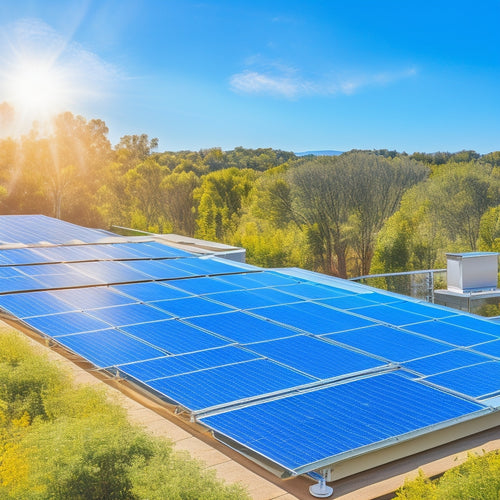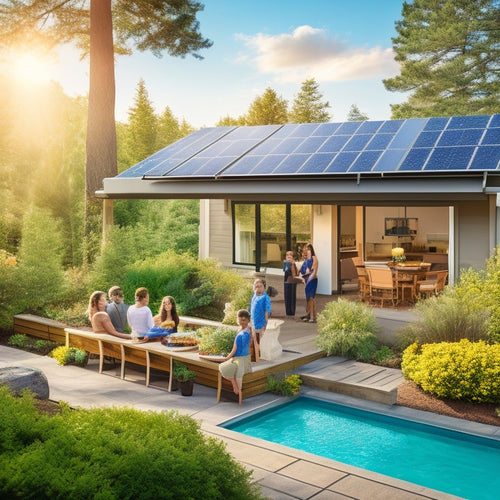
7 Tips for Home Appliance Energy Freedom
Share
To achieve energy freedom for your home appliances, start by evaluating your energy consumption through an audit and tracking your daily habits. Next, choose the right solar panels for your needs, considering factors like efficiency, durability, and cost. Optimize your appliance load by replacing energy-hungry devices and creating an energy profile. Select a suitable battery capacity based on your daily energy usage, and consider energy storage options like lead-acid, lithium-ion, or nickel-cadmium batteries. Implement smart home automation to streamline energy consumption, and monitor your energy savings to identify areas for improvement. As you implement these strategies, you'll uncover even more opportunities to fine-tune your energy independence.
Overview
- Conduct an energy audit to identify inefficiencies and develop strategies for improvement in your home.
- Choose the right solar panels by evaluating types, efficiency, durability, and cost, and ensuring compatibility with mounting hardware.
- Optimize appliance load by identifying and replacing energy-hungry appliances, creating an energy profile, and performing regular maintenance.
- Select a suitable battery capacity by calculating daily energy usage, considering battery types, and oversizing by 10-20% for unexpected energy usage.
- Implement smart home automation to streamline energy consumption, utilize smart thermostats, and employ automated lighting and remote appliance control.
Assess Your Energy Consumption
Your energy consumption habits have a direct impact on your wallet and the environment. By understanding your energy usage, you can make informed decisions to reduce your energy bills and carbon footprint.
Start by conducting an energy audit to identify areas of inefficiency in your home. This will help you pinpoint which appliances and devices are consuming the most energy.
Take note of your daily consumption habits, such as leaving lights on or running multiple devices at once. By identifying these patterns, you can develop strategies to enhance your energy usage and achieve energy freedom.
In addition, consider high-efficiency panels and durable mounting systems to maximize your energy harvesting potential.
Moreover, regular maintenance, such as cleaning your solar panels every 6-12 months, is vital to maintain peak performance. A thorough assessment will enable you to make changes that benefit both your wallet and the environment.
Choose Right Solar Panels
Now that you've assessed your energy consumption and identified areas for improvement, it's time to contemplate the most efficient way to employ renewable energy.
When choosing the right solar panels, you'll need to take into account the type that suits your needs. Monocrystalline, polycrystalline, and thin-film solar panels are the most common types. Each has its advantages and disadvantages, so research and compare their efficiency, durability, and cost.
High-quality solar panels should feature durable materials and sturdy construction for longevity in various environmental conditions. Additionally, guarantee a well-integrated system requires compatible mounting hardware for stability and safety.
The installation process is also essential, as it affects the system's performance and longevity. Ensure a professional installation team handles the job to avoid any potential issues.
Optimize Your Appliance Load
The household's energy consumption environment is about to undergo a significant change as you prepare to optimize your appliance load. This vital step guarantees you're making the most of your energy efficiency efforts.
Start by identifying energy-hungry appliances and replacing them with energy-efficient alternatives. To verify accurate calculations, create an energy profile listing device power ratings and daily usage hours.
Regular appliance maintenance is also key, as dirty or malfunctioning appliances consume more energy.
Next, assess your daily usage patterns to determine the best times to run appliances like dishwashers and washing machines. By doing so, you'll reduce peak energy consumption and minimize strain on your energy system.
Select Suitable Battery Capacity
You're about to specify the battery capacity that will store excess energy generated by your optimized appliance load, ensuring a seamless changeover to energy freedom.
To determine the suitable capacity, calculate your daily energy usage in watt-hours (Wh). Consider the type of batteries you'll be using, as different battery types have varying depths of discharge (DOD) and round-trip efficiencies.
For example, lithium-ion batteries have a higher DOD and efficiency compared to lead-acid batteries. Calculate your capacity requirement based on your energy usage, desired autonomy, and the battery type's specifications.
A general rule of thumb is to oversize your battery capacity by 10-20% to account for unexpected energy usage.
Consider Energy Storage Options
Three primary energy storage options are available for your home appliance energy system: lead-acid, lithium-ion, and nickel-cadmium batteries.
Each has its pros and cons, which you should weigh carefully. Lead-acid batteries are the most affordable, but they're heavy and have a shorter lifespan.
Lithium-ion batteries are more efficient and last longer, but they're pricier.
Nickel-cadmium batteries offer a balance between cost and performance.
When choosing a battery technology, consider your energy independence goals and the specific demands of your appliances.
By selecting the right energy storage option, you'll be one step closer to achieving true energy freedom.
Research and compare the different battery technologies to find the best fit for your needs.
Implement Smart Home Automation
Streamline your energy consumption by integrating smart home automation into your daily routine.
By doing so, you'll access smart thermostat benefits like ideal temperature control and energy efficiency.
Automated lighting solutions will also help reduce energy waste by turning off lights when not in use.
With smart home automation, you can control and monitor your appliances remotely, ensuring they're not consuming unnecessary energy when you're away.
This level of control gives you the freedom to make data-driven decisions about your energy usage, allowing you to enhance your consumption and reduce your energy bills.
Monitor Your Energy Savings
You're now ready to monitor your energy savings by tracking your energy usage patterns, which will help you identify areas of inefficiency.
Start by analyzing your past utility bills to pinpoint when and where energy consumption spikes. This information will enable you to identify energy-wasting appliances and make informed decisions about replacements or upgrades.
Track Energy Usage Patterns
One of the most effective ways to reduce your energy consumption is to track energy usage patterns. By doing so, you'll gain important understandings into your daily energy usage habits.
This involves energy monitoring, which provides you with detailed usage analytics. You can install smart plugs or whole-home energy monitoring systems to collect data on your energy usage.
This data will help you identify areas where you can cut back on energy waste. For instance, you might find out that your TV consumes a significant amount of energy when left on standby.
With this knowledge, you can take action to optimize your energy usage and make informed decisions about your appliances. By tracking your energy usage patterns, you'll be well on your way to achieving energy freedom.
Identify Energy-Wasting Appliances
Your energy monitoring data will likely reveal a list of appliances that are secretly draining your energy resources. Now it's time to identify the culprits and take action. Review your energy audits to pinpoint which appliances are inefficient and wasting energy.
| Appliance | Energy Consumption (kWh) | Appliance Efficiency (%) |
|---|---|---|
| Refrigerator | 1500 | 80 |
| Air Conditioner | 3000 | 60 |
| Clothes Dryer | 1200 | 70 |
| Oven | 800 | 50 |
| Microwave | 400 | 90 |
Frequently Asked Questions
Can I Install Solar Panels on a Rented Property?
You're considering solar panels on your rented property, but renting challenges abound; investigate solar panel options like community solar programs or portable systems that don't require installation, ensuring you're not tied to the property.
Do Energy-Efficient Appliances Save Significant Energy?
As you ponder the impact of energy-efficient appliances, imagine your wallet breathing a sigh of relief. Yes, you'll reap significant energy savings, with appliance efficiency translating to a whopping 30% reduction in your energy consumption, giving you the freedom to spend elsewhere.
Will Energy Freedom Increase My Property's Value?
You're likely to enhance your property's appeal and resale value by investing in energy upgrades, as they'll make your home more attractive to eco-conscious buyers and increase your property's value in the long run.
Are Energy Storage Batteries Environmentally Friendly?
You're right to wonder if energy storage batteries are environmentally friendly; their eco-friendliness depends on responsible battery disposal and minimizing environmental impact through sustainable manufacturing, recyclable materials, and proper end-of-life management.
Can I Use a Single Battery for Multiple Appliances?
You might think a single battery can't handle multiple appliances, but it's possible with the right compatibility and power management system, allowing you to efficiently distribute energy and gain freedom from reliance on the grid.
Ready to Buy
You've taken the first step towards home appliance energy freedom by evaluating your consumption, choosing the right solar panels, and optimizing your appliance load. You've selected a suitable battery capacity, considered energy storage options, and implemented smart home automation. Now, as you monitor your energy savings, imagine waking up to a fully charged battery, powering your home with clean energy, and enjoying the freedom from utility bills. Your path to energy independence is unfolding, and a sustainable future is within reach.
Related Posts
-

What Types of Solar Energy Devices Are Available
You'll find several types of solar energy devices available today, each customized to different energy needs. Photovo...
-

Top 10 Off Grid Camping Gear Must-Haves
When you're off-grid camping, the right gear is crucial for a smooth expedition. Start with a durable, weather-resist...
-

Top-Rated Home Solar Power Kits for Achieving Energy Independence
Top-rated home solar power kits enable you to achieve energy independence by greatly cutting your energy costs. You c...


